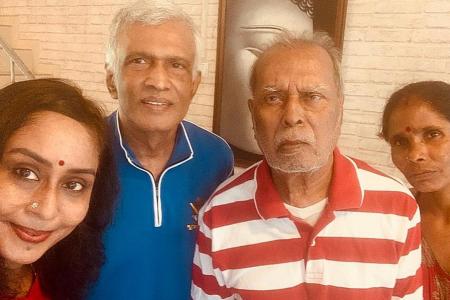Circuit breaker takes its toll on dementia caregivers
They experience fatigue at home with daycare and the Alzheimer's Disease Association centres closed
While people are struggling with being cooped up at home, life is even tougher for those with dementia and their caregivers, as their support is limited due to the circuit breaker.
One of these caregivers is Madam Suganthi Kesavan, 57, who looks after her husband and father, who are both diagnosed with dementia.
They usually spend their weekdays at a daycare, but like many services, the centres have been suspended due to the circuit breaker.
The plight of caregivers has exacerbated as the Alzheimer's Disease Association's (ADA) assistance has been limited due to the closures of its centres, said chief executive Jason Foo in a statement.
Services were generally limited to non-contact interaction, such as online programmes, care package deliveries and caregiver support groups via Zoom.
Looking after their loved ones now rests solely upon the shoulders of Madam Kesavan, her 28-year-old son and their helper.
After teaching online dance classes in the morning, Madam Kesavan draws up activities for her husband and father, from karaoke sessions to short walks.
But they grow restless at times. Her father, 93, once sneaked out of the flat, only to be brought back by a concerned neighbour. Two weeks ago, he accidentally bent the helper's finger in a fit of frustration.
Madam Kesavan is worried about him regressing during isolation. She has noticed that he would forget he has eaten and demand for food after five minutes.
Meanwhile, her husband, a former warrant officer in the army, often chats for many hours before falling asleep, depriving her of rest.
She said: "Sometimes I break down and just want to find time to sleep because I am so exhausted. How long is this drama going to last?"
But some moments are rewarding for her. When her husband is in a good mood, he looks at her and thanks her.
"It is not every day, but I am happy when I see a smile on their faces."
Another caregiver, Ms Belinda Seet, 62, observed her 88-year-old mother has begun to forget things in a few minutes instead of the usual few hours.
Ms Seet, an early childhood studies lecturer, said: "I am worried that staying home could affect her because the brain needs stimulation."
She often involves her mother in decisions at home and also accompanies her to sleep.
"I want her to feel she is a valuable part of the home, build her self-esteem and let her know I love her a lot."
Mr Foo said caregivers will face greater stress during this period of isolation.
He said: "It is already difficult for people cooped-up at home...
"Imagine how stifling it will be for people with dementia who need that social and mental interaction even more than others."
ADA recently introduced Spoc-19, a support initiative for people with dementia during Covid-19, giving identifiers so enforcement authorities can recognise them easier and offer assistance. These include a safe return card, an emergency contact sticker and a new ADA Memo.
RELIEVE
Chief executive of the Agency for Integrated Care Tan Kwang Cheak said: "We hope (identifiers) will relieve the caregivers' stress during this period and avoid unpleasant situations for their loved ones outside their homes."
Caregivers or people with dementia in need of support may call the ADA Dementia helpline on 6377-0700.
Register for the ADA memo at alz.org.sg/ADAmemo
Get The New Paper on your phone with the free TNP app. Download from the Apple App Store or Google Play Store now



